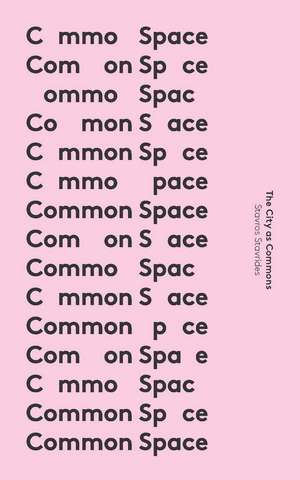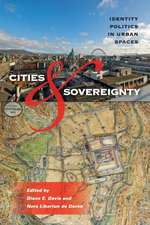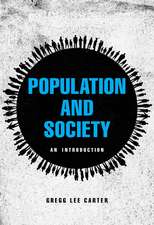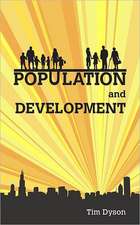Common Space: The City as Commons
Autor Stavros Stavridesen Limba Engleză Paperback – 14 feb 2016
How often do we consider the availability of shared, public space in our daily lives? Governmental efforts in place—such as anti-homeless spikes, slanted bus benches, and timed sprinklers—are all designed to discourage use of already severely limited public areas. How we interact with space in a modern context, particularly in urban settings, can feel increasingly governed and blocked off from common everyday encounters.
With Common Space, activist and architect Stavros Stavrides calls for a reconceiving of public and private space in the modern age. Stavrides appeals for a new understanding of common space not only as something that can be governed and open to all, but as an essential aspect of our world that expresses, encourages, and exemplifies new forms of social relations and shared experiences. He shows how these spaces are created, through a fascinating global examination of social housing, self-built urban settlements, street peddlers, and public art and graffiti. The first book to explicitly tackle the notion of the city as commons, Common Space, offers an insightful study into the links between space and social relations, revealing the hidden emancipatory potential within our urban worlds.
With Common Space, activist and architect Stavros Stavrides calls for a reconceiving of public and private space in the modern age. Stavrides appeals for a new understanding of common space not only as something that can be governed and open to all, but as an essential aspect of our world that expresses, encourages, and exemplifies new forms of social relations and shared experiences. He shows how these spaces are created, through a fascinating global examination of social housing, self-built urban settlements, street peddlers, and public art and graffiti. The first book to explicitly tackle the notion of the city as commons, Common Space, offers an insightful study into the links between space and social relations, revealing the hidden emancipatory potential within our urban worlds.
| Toate formatele și edițiile | Preț | Express |
|---|---|---|
| Paperback (1) | 201.17 lei 3-5 săpt. | |
| ZED BOOKS – 14 feb 2016 | 201.17 lei 3-5 săpt. | |
| Hardback (1) | 511.14 lei 6-8 săpt. | |
| ZED BOOKS – 14 feb 2016 | 511.14 lei 6-8 săpt. |
Preț: 201.17 lei
Nou
Puncte Express: 302
Preț estimativ în valută:
38.49€ • 39.71$ • 32.12£
38.49€ • 39.71$ • 32.12£
Carte disponibilă
Livrare economică 05-19 martie
Preluare comenzi: 021 569.72.76
Specificații
ISBN-13: 9781783603275
ISBN-10: 1783603275
Pagini: 256
Dimensiuni: 140 x 216 x 23 mm
Greutate: 0.45 kg
Editura: ZED BOOKS
Colecția Zed Books
Locul publicării:London, United Kingdom
ISBN-10: 1783603275
Pagini: 256
Dimensiuni: 140 x 216 x 23 mm
Greutate: 0.45 kg
Editura: ZED BOOKS
Colecția Zed Books
Locul publicării:London, United Kingdom
Notă biografică
Stavros Stavrides is an architect, activist, and associate professor of architecture at the National Technical University in Athens, Greece.
Cuprins
Introduction: Threshold spaces and commoning practices
Part 1: Inhabited spaces
1. In search of shared heterotopias
2. Housing as commons
3. Big city streets as contested spaces
4. Communities in movement: occupied squares
Part 2: Envisaged spaces
5. Thought-images and representations of the city-commons
6. Representations of space and representations of emancipation
7. Practices of defacement: thresholds to rediscovered commons
Part 3: Reinventing the city Conclusion
Part 1: Inhabited spaces
1. In search of shared heterotopias
2. Housing as commons
3. Big city streets as contested spaces
4. Communities in movement: occupied squares
Part 2: Envisaged spaces
5. Thought-images and representations of the city-commons
6. Representations of space and representations of emancipation
7. Practices of defacement: thresholds to rediscovered commons
Part 3: Reinventing the city Conclusion
Recenzii
“Stavrides was one of the first to open my eyes to the importance of the urban commons. His writings are exciting, a valuable reference for urban activists around the world. He is right: the city is the place where we can and should truly reinvent the commons.”
“How shall we understand the pulse and power of commoning, the subtle force that is constantly shaping the spaces and experiences of modern cities? Stavrides provides a rich, erudite exploration of this neglected topic and the potential for human emancipation.”
“Stavrides provides a wonderful guide to how we can make urban space common. He draws from the history of social housing and the successes of contemporary protest movements to formulate an exciting political project.”
“A much needed breath of fresh air. This is a book for all those interested in moving beyond the politics of enclosure, fear and individualism to a politics of hope, possibility and social inclusion in the contemporary city.”
“The Foreword hails Common Space as ‘the first theoretical book of its kind, the first book to problematise space as commons.’ And this is precisely where the value of Stavrides’ contribution is found. The examples are used to ground his argument historically and philosophically. They are not used as ideal examples from the past that should act as templates for the future.”
“Common Space is the first of its kind . . . an in-depth journey into the concept of common space . . . relevant to students, academics and practitioners alike.”
“Stavrides escapes the Eurocentrism that often predominates in the literature on the urban commons. . . . The book will appeal not only to scholars across many disciplines, but also to activists who seek to engage with the significance of urban space for their political action.”
“A fascinating and path-breaking book, which can inspire activists and theoreticians alike. It enriches the academic bibliography of geography, planning, sociology, cultural studies, social anthropology, political science, and more disciplines focusing on the contemporary city.”
Descriere
Descriere de la o altă ediție sau format:
The book explores the interconnections between processes of spatial transformation and processes of political subjectivation, focusing especially on socio-spatial experiences which reveal the potentialities inherent in contemporary metropolitan life.
The book explores the interconnections between processes of spatial transformation and processes of political subjectivation, focusing especially on socio-spatial experiences which reveal the potentialities inherent in contemporary metropolitan life.












